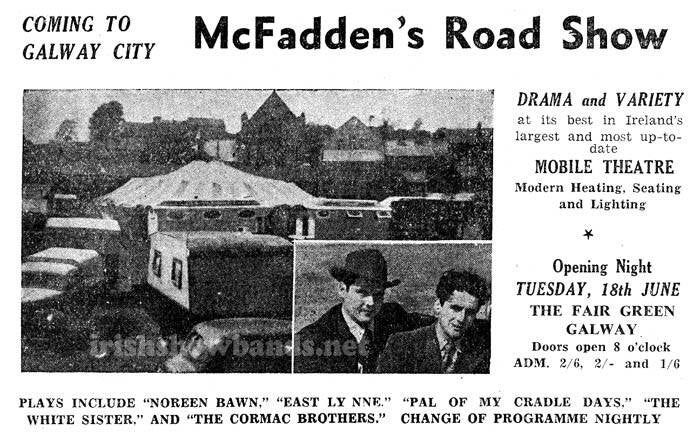
McFaddens Road Show comes to Galway City. Photo Courtesy of Irish Press
The McFadden Roadshow
An afternoon in the company of Harry and Eileen McFadden.
By Gerry Costello
The McFadden family would have been the most famous and the most well known family in the show business world when travelling roadshow families were the only people to bring films, theatre, variety shows, shooting galleries, bagatelle, swinging boats and many other amusements to the people in rural Ireland,. The show people, as they were known as, travelled down backroads and boreens to small villages and settlements during the 1800’s and on until the late 1960’s when television began to become the more popular medium of entertainment in those rural and backward areas of every county in Ireland. So popular were the McFadden roadshow, that even sometimes when some other family spent a week or two in the local area here in Skehana/Menlough that everybody assumed it was the McFadden roadshow that was here.
And so today, June 28th. 2019, Sean Conneely and myself travelled to Rocky Valley, Kilmacanogue, Co Wicklow to spend an afternoon in the delightful company of Harry and Eileen McFadden at their most beautiful home looking out on the Wicklow mountains. Harry told us that his fathers people were in Belfast in Hollywood Arches going back 160 to 170 years ago. His father went into a riding school there and became a genius with horses. he then toured his own small amusement show. He toured all of Ireland in the hard times and during the troubled times. Later on he ran a picture show and was one of the first to have the talking picture shows in Ireland. He went from town to town and stayed approximately two to three weeks in each showing a different film each night. After that the whole family went into the variety show business.
The Family
Harry had four more brothers with himself, George, Johnny, Jimmy, Teddy and they put different shows on the road. Harry and his wife Eileen, formerly Eileen Mirth, whom incidentally also came from the show business world also, toured nearly every town and village in Ireland with their own show. Harry is today in his 90th. year with his wife Eileen in her 88th. year and Harry is the last of the five McFadden brothers still living.
When Harry and Eileen’s family grew up, their son Harry and daughter Thelma went into the funfair business. A few years ago, Harry (Snr.) and his wife Eileen decided to retire and fully settle down in the beautiful location of Kilmacanogue in Co. Wicklow. The Fox McFadden Funfair is still thriving and now another generation of the family is being groomed to take up the baton going forward.
The Early Days
At the time of Harry’s growing up life in Ireland was not easy for most people and he recalls that it was not any more difficult for them than it was for the people if Ireland that he came in contact with along the way. At that time there were twenty or thirty different variety shows travelling the towns and villages. They used to book halls. The McFadden’s had an advantage in the sense that they built their own mobile theatre and they could hire a field or a site off a farmer in any location and erect their own mobile theatre and they could stay there as long as they liked. That cut down on the expenses of paying for Halls. Another huge advantage of doing this was that they could visit any village in any location as not every village or even rural parish had a hall in those days. Furthermore, all of the more remote villages were craving for entertainment, glamour and a diversion from the humdrum everyday existence that they survived in, that it was a great sense of occasion and a most welcome site to see the Roadshow arrive in the village. If we think back, there was probably only one radio in most villages in those days if they were lucky enough to even have the one. When Harry and Eileen were travelling in those days they had around fourteen of a company. They would be able to sing and dance and able to play parts in the plays and drama that Harry and Eileen would put on. Dramas such as “East Lynne”, “The Song of Bernadette”, “Noreen Bawn”, etc. The programme was changed every night. They worked down to the audience and the audience got familiar with them and they got a good reaction and feedback which was reward to them plus the financial remuneration was also most rewarding and kept the show on the road.
Facilities
They had to be resourceful also as they had to dabble in everything. They built and maintained their own theatre, their own trailers, seating, mechanical works, electrical maintenance, etc. They were also one of the first to have a heated mobile theatre for their patrons. They also had their own accommodation to maintain and look after as well. They had American style mobile homes which were well equipped with full modern facilities such as fridges, washing machines, hot and cold water, shower rooms, flush toilets, etc. “At that stage’, says Harry, “we used to run our own generator. My dad was the first man to ever light an electric light bulb in the town of Roscommon from his own generator”.
Eileen McFadden
Eileen was also born into the show business word formerly being Eileen Mirth. her father was from England. her mother and father started a theatre in Ireland and travelled the thirty two counties. They did variety and drama. Eileen did some singing and guitar playing. Her music was country & western. She also did tap dancing and performed as an acrobat also. This was her life until she met Harry. When she was nineteen, her father became ill and around Christmas time, she joined McFadden’s Roadshow just as a job to earn some money and probably with the intention of helping her parents out. She continued on with the stage show and eventually, they both got married she moved to southern Ireland. They went on to have three children.
Galway City
They were the first tented show that ever went into Galway under canvas. It was a major step for them going into the big city from the rural travelling and they were taking a huge step into the unknown. The first night they were there they opened for twelve pounds which was very, very small and would not cover the costs. They had done an extensive publicity campaign beforehand and felt a bit disillusioned on the opening night. The second night they took forty pounds and it went to fifty pounds the third night. The show steadily got more popular and they remained there for the seven weeks of Lent. Harry says, “The people were so nice and friendly and all were so good to us. They were marvellous times”.
Education
In their young days, they had to go to school in whatever village they were set up in for the few weeks while they were there. “It was a little bit awkward”, states Harry, “because you were in a strange school every three or four weeks but we used to go to the same villages every year, we used to do a particular run and when we would come back to the same villages the teachers got to know us and we got a little bit of education and we managed to survive”. He went on to say that “while we did not get all that much education going to school, the same emphasis was not on education as it is today. Today it’s essential. We did make sure that all our children went to school and on to college, so thank God they have a full education”.
The War Years
During the war years Harry was quite young, but his parents, John and Florence, continued to tour all the villages during that time and received no trouble at all, but were always aware that they were dangerous times. There were shootings and ambushes here and there but they continued to keep the show on the road throughout these difficult times. They made very good friends with a gentleman in a little village called Ballinalee. It turned out that he was the Blacksmith in the village. Harry’s father, John McFadden, and him got very, very friendly but some weeks prior to that there was a big ambush in the village and on the same night Harry’s father was walking along the road looking for a horse that escaped from the field where they had set up the show. A man on a bicycle came along, stopped and took out a revolver and put it to John’s head, was about to pull the trigger but for some reason stopped and asked John who he was. he told the man that he was with the show and was putting the horses back into the field from where they had broken loose. On hearing this the gunman told him to go to bed, put out all lights and not to come out again until morning. Weeks after that on their final night in that village the Blacksmith was in the caravan with his mum and dad as had become his normal routine now almost nightly since they had arrived. At this time he was a bit down and sad and Harry’s mother, Florence, asked if he were alright. He said “I’m fine, you know I’ve only got to know you and your husband over the past three weeks and I’ve never got so fond of anyone in all my life, and to think that I was within a fraction of blowing your brains out that first night I met you on the road”. It turned out that he was the gunman on the bicycle that night. Later on as years went by they found out that he was Lt. General Sean McKeown. There was an ambush planned for that night and his orders were to ensure that nobody would observe what was happening and he was to patrol the roads and shoot anyone that he met. He was commonly referred to as Lt. General Sean McKeown, the “Blacksmith of Ballinalee”.
Hired hands
At most times Harry would have twelve to fourteen hired hands. They would be variety artists, singers and dancers and would also lend a hand to the set up and dismantling of the show as required. Usually they would do one to three years with the McFaddens and might move on to other shows and people who performed in other shows moved to join McFaddens. It was a great draw for artists to join McFaddens because they did three months summer season in places like Salthill, Bundoran, Ballybunnion and that was handy for the rest of the artists because it was also a holiday for them at the seaside. There was little opposition between the various roadshows and any that existed was friendly. They were all a good old crew and helped each other like one big happy family. Many small shows went from hall to hall but at the peak of things there were about fifty doing the circuit.
Superstitions
Some artists had certain superstitions. One was it was deemed unlucky to whistle in the dressing rooms. Harry tells us that this one may still exist amongst some of todays acting fraternity. Another one was that they would be concerned if they were to see ivy growing on a hall where they were to perform but Harry himself never believed in such things and never observed these traditions. He would never let himself believe in anything lake that.
Family Tragedy
Harry’s brother, Johnny was drowned in a bathing tragedy at Glenamaddy, Co. Galway on August 15th. 1947 at the age of 25 and is laid to rest in Glenamaddy. His parents, John and Florence, are also laid to rest alongside Johnny as is his brother, James (Jimmy), who passed away on May 26th. 2014. Harry and Eileen also had a daughter, Sylvia, who was a singer/songwriter and entered and sang one of her compositions, “Don’t Walk Away” in the 1981 National Song Contest. Sadly, Sylvia passed away some time later.
The Customs Officer
A incident took place in the Menlough/Brierfield area back in 1947 and was reported in the Tuam Herald of August 16th. 1947. The report stated that there was uproar in a travelling cinema marquee at Brierfield, Menlough, when a Revenue officer made an inspection. The story goes on to say that the inspector arrived to inspect the half tickets that the customers held against the half that was held by the show owner, John McFadden. The show was interrupted by the inspector, P.J. Frost, and members of the audience were so annoyed by this intrusion that some threw clods at Mr. Frost eventually forcing him to abandon his inspection. The incident ended up in Derreen District Court before District Justice Sean McGiollarnath. It transpired that John McFadden produced 197 half tickets on the night which corresponded to the amount of people at the show. The Justice Justice further stated that Mr. Frost should have brought police protection with him on the night if he felt there was going to be any trouble and dismissed all charges against the McFadden Roadshow. Harry remembers and recalls the incident with much amusement. He told us that at that time the cinemas had to pay entertainment tax. When you bought your roll of tickets you also had to buy a roll of stamps and each ticket had to have a stamp stuck on. The customer bought their ticket at the box office, the door person received the ticket at the entrance, tore it in half and the door person retained one half and the customer retained the second half. Occasionally an inspector would call in and check the audience half tickets for stamps and would check the total audience against the quantity of halves held at the door. Harry recalls also that there was an inspector by the name of Frost who was exceptionally zealous in the pursuit of his duties. At that time also, the local Sargent in the area was particularly fond of John McFadden, got word that the inspector was calling on that night and made sure that John was aware of the imminent arrival so everything was above board. The inspector, Harry recalls, slipped and fell on the way in, probably ruined his clothes in the mud and was obviously not impressed, especially when the audiences’ welcome was not too friendly.
Names and Places
Harry went on to recall names and places they visited. He well remembers Paddy Joe and Maura Burke from Menlough. He remembers the show site at Esker (Skehana) and the old castle at Garbally. Garda McEvoy, the Cullen family, Cathy and Brendan Duddy all from Monivea. He used to play football with Tom Hussey and Joe O’Neill in Glenamaddy before the shows there at night. In every village they went to they were well received and made life long friends along the way.
The Clergy
The clergy were great in general but a few could be very difficult as they did not like the idea of a variety show coming into their parishes as they considered that it was inappropriate entertainment. They had that little bit of power then which has, thankfully, evaporated nowadays. One of Harry’s great friends is Fr. Brian D’arcy. Fr Brian was actually their Chaplin in the Show-business and they still keep up contact with each other. Harry says that if anyone were to ask him what would be the definition of a good priest, he would just turn to them and say Fr. Brian D’arcy. He recalls being in a village once and thinks it was Dunmore. At that time, Harry himself used to do a comedy spot in the variety show and would tell jokes. Some of the jokes were what we would describe as ‘over the edge’. At that time the priest would come an odd time in the middle of the performance and stand at the back of the hall. Harry would spot him from the stage and naturally would ‘calm down’ his jokes a little. The priest knew this and one day told Eileen, Harry’s wife, to tell Harry that the next time he was doing his act not to bother about him, let them fly as he liked a good joke as well as the next man.
The Coming of Television
The coming of television, the Singing Lounges and bingo took its toll on the travelling variety shows. Many of the artists of the variety shows were now looking towards RTE and the shows there, like Tolka Row, The Riordans, Glenroe, for more permanent and settled work. People like John Cowley (Tom Riordan in The Riordans), Anne D’alton (Minnie Brennan in The Riordans), Robert Carrickford (Stephen Brennan in Glenroe) were all part of the Fit-ups and variety road shows that travelled around Ireland. Artists were getting harder to employ as television was taking some of the better ones off the road. Harry McFadden found that while many nights they would be filled to capacity but should there be a big bingo on locally or if there was a TV programme that commanded a high following then their business was well down. He saw the writing on the wall and decided to change out of the business which left them with two options. They could either start a circus or go into the amusement business. Harry opted for the amusement business and by doing this covered a lot of the festivals around the country. He opened the first Strawberry Festival in Enniscorthy about 35 years ago and their funfair has been there every year since.
View some footage of the McFadden Family History
Just double click on the green Buttons
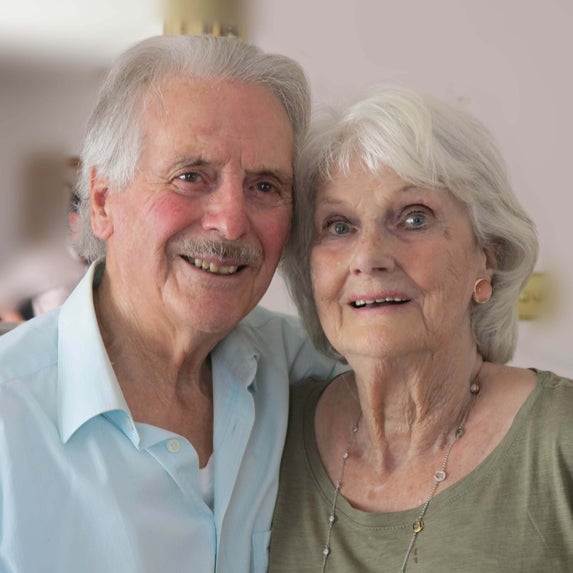
Harry & Eileen McFadden Photo: Gerry Costello
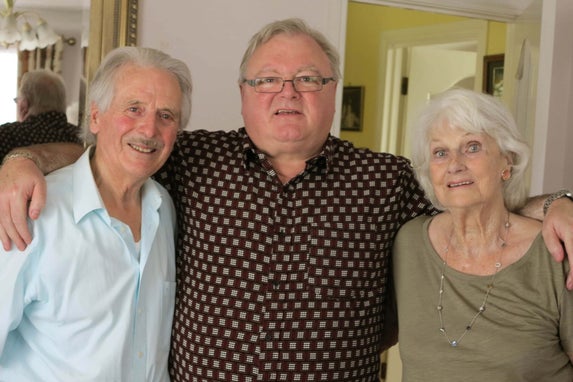
Harry & Eileen McFadden with Gerry Costello Photo: Gerry Costello
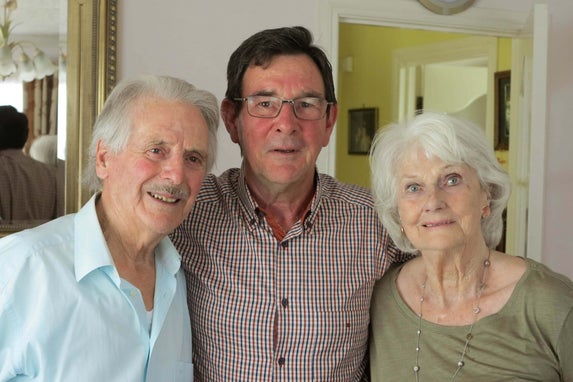
Harry & Eileen McFadden with Sean Conneely. Photo: Gerry Costello
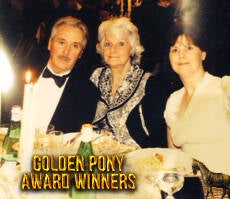
Harry & Eileen McFadden with their daughter, Thelma Fox McFadden at the presentation of the Golden Pony Award which was awarded to Harry.
Photo: Copyright Control:
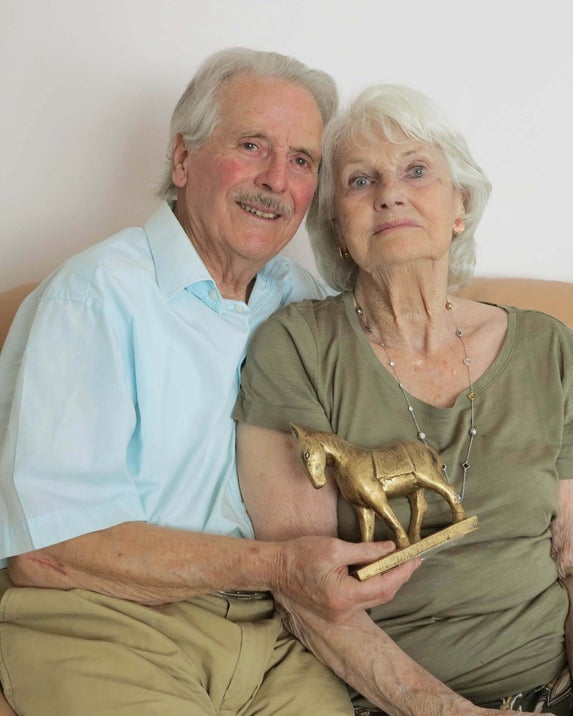
Harry & Eileen McFadden with the Golden Pony Award. Photo: Gerry Costello
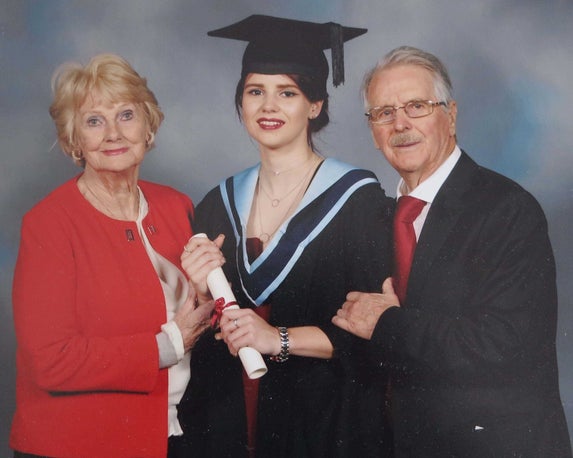
Eileen and Harry McFadden with their granddaughter on the occasion of her conferring ceremony.
Photo: Lafayette Studios, Dublin
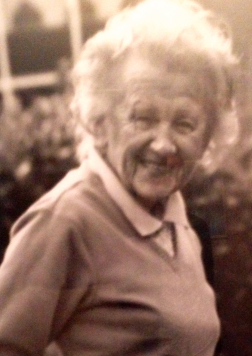
Bell McFadden (nee Ussher from Oranmore) was the wife of the late George McFadden. She passed away on May 24th. 2014
Photo: Copyright Control
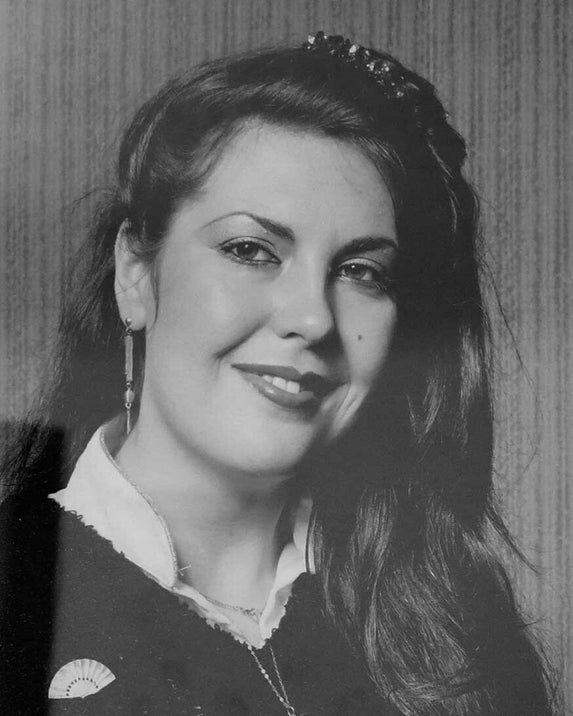
The late Sylvia McFadden. Singer/Songwriter of the song "Don't Walk Away" in the National Song Contest 1981.
Photo: John Rowe
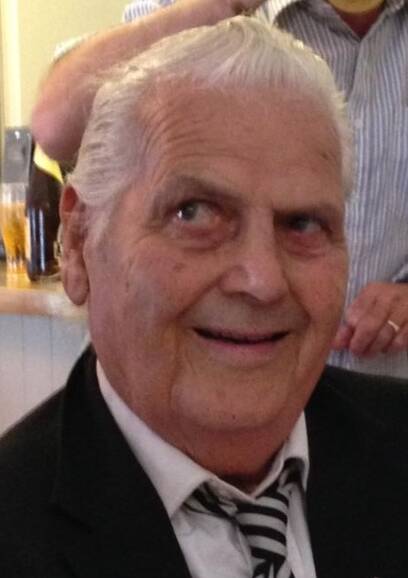
The late Jimmy McFadden who passed away on May 16th. 2014.
Photo: Copyright Control.
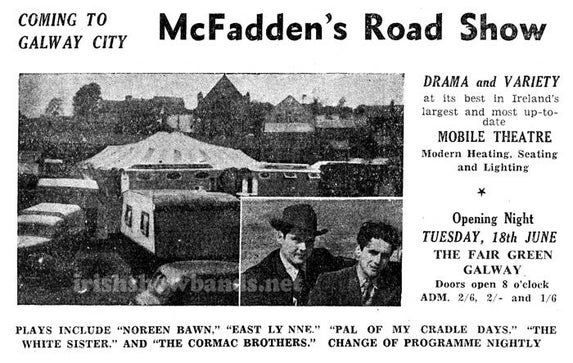
McFaddens Road Show comes to Galway City
Photo Courtesy of Irish Press
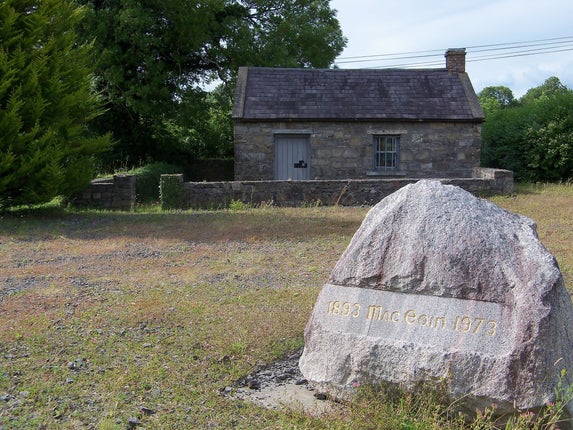
The Forge in Ballinalee where the blacksmith, Sean McKeown worked
Photo: Andrew J Hill
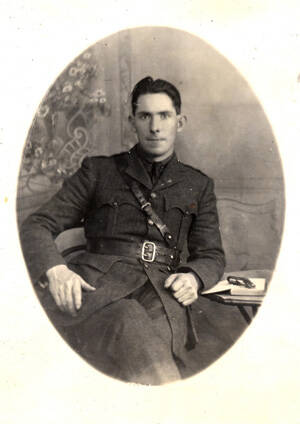
Lt. Gen. Sean McKeown. Photo: Public Domain
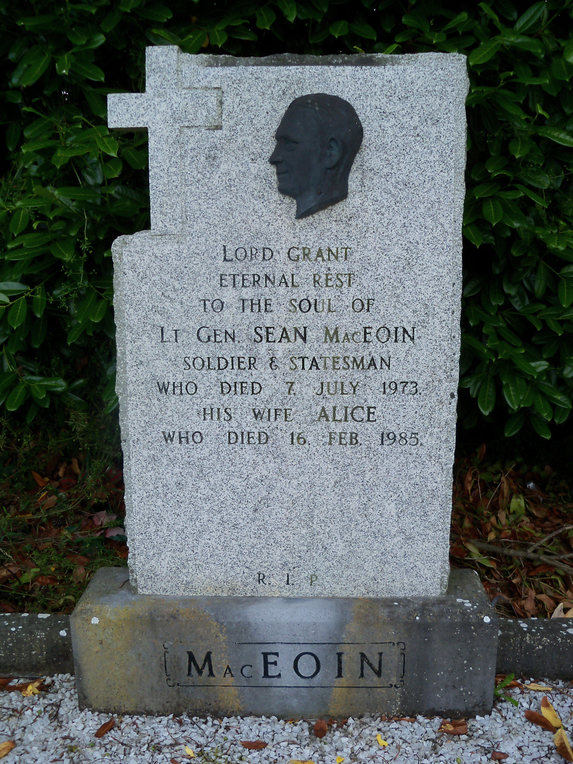
The Grave of Sean McKeown. Photo: Andrew J Hill

The McFadden Plot in Glenamaddy Cemetery. Photo: Gerry Costello

Fox McFadden Fun Fairs. Photo Credit: Thelma Fox McFadden
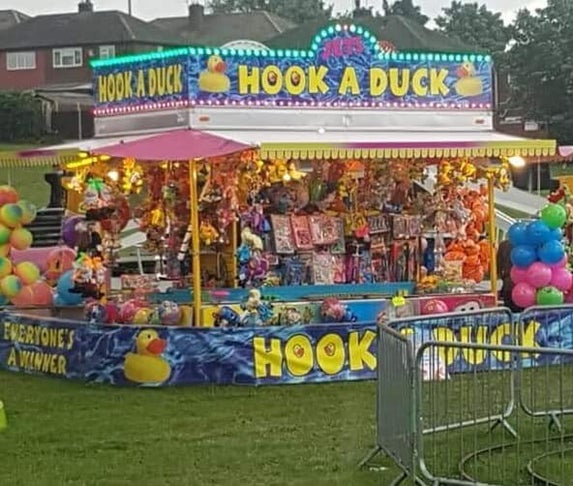
Fox McFadden Fun Fairs. Photo Credit: Thelma Fox McFadden
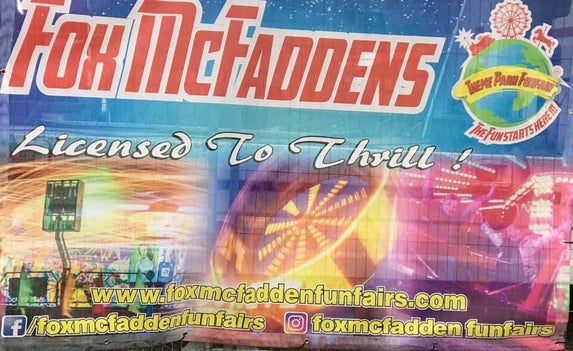
Fox McFadden Fun Fairs. Photo Credit: Thelma Fox McFadden
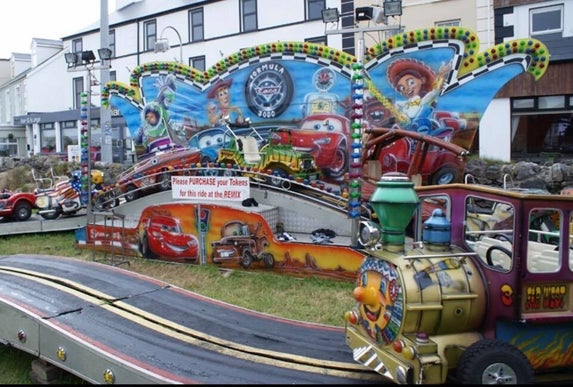
Fox McFadden Fun Fairs. Photo Credit: Thelma Fox McFadden
(Continued) .....
Retired
Harry and Eileen are now retired but their son Harry (Jnr) and daughter Thelma each have their own funfair business and they are keeping the business going at present. They are both enjoying life and a happy retirement in their most beautiful home in Rocky Valley, Kilmacanogue, Co Wicklow overlooking the Wicklow mountains and enjoying the wonderful views from this idyllic and peaceful location.
UPDATES
August 18th. 2025
Saddened to learn of the passing of the late Eileen McFadden on December 10th. 2024 from her daughter, Thelma Fox McFadden.

The Late Eileen McFadden,
Rocky Valley, Kilmacanogue, Wicklow
&
Carrick-on-Shannon, Leitrim
A Story about Michael McFadden from an anonymous reader
I remember well the anticipation and excitement when McFadden’s travelling roadshow came on its annual visit to Kanturk. The players set up their makeshift theatre and presented a different show every night for a week. I remember The Colleen Bawn was a staple. As well as the play there would be a talent show with local singers, dancers and musicians invited to take part. There would always be a raffle. It was my first introduction to live theatre and it was brilliant. We had Up Cork shows and local pantomines in The Edel Quinn Hall and, of course, the circus but the full week of entertainment was the highlight of my cultural calendar back then.
I didn’t know the Listowel connection until I read the following obituary in the Kildare Nationalist.
ATHY MOURNS PASSING OF MICHAEL MCFADDEN WHO HAD SHOW BUSINESS IN HIS BLOOD
The death has occurred in Athy of popular and highly respected former showman Michael McFadden. Michael, who was a member of the well known show family, was a fantastic and talented musician who played with numerous groups during his life. He passed away peacefully surrounded by his loving family on Sunday last 14 June.
His passing is deeply regretted by his loving wife Dinah, children Evelyn, Bernadette, Theresa, Frank, Ann and Malissa, brothers Frank and Marcus, grandchildren, great-grandchildren, extended family and friends.
Michael’s grandparents operated the Belfast Hippodrome over 100 years ago. James McFadden, his grandfather, was a violinist and his grandmother Catherine the business woman who ran the Hippodrome for many years. Artists were brought to Belfast from abroad for the weekly shows produced on the Hippodrome stage and strange to relate one of those acts were John and James Duffy who were later to establish the famous Duffys Circus. The Hippodrome in time was to close and the McFaddens took to the road crossing and re-crossing the 32 counties with the McFadden Variety Roadshow.
Michael’s father married Catherine Hayes, daughter of the owner of Hayes Roadshow and both continued to travel with the McFaddens Road Show. With the usual mixture of variety acts followed by a second half film show road shows were popular in every town and village in Ireland. Travelling by caravan pulled by horses in the early years and later by motorised power the road shows generally stayed a week in each area. Michael’s Uncle, Jack McFadden, in keeping with the travelling show tradition married another show person and their sons were Jimmy, Henry, Teddy and George McFadden of the famous McFadden Shows of recent times.
Michael’s grandmother died in 1938 at a time when his father had temporarily retired from show business to live in Limerick City. Michael attended school in Limerick until 1942 by which time he had learned to play the violin. The McFadden family again took to the variety road show circuit by joining the Hayes Road Show owned by Mr. McFadden’s father-in-law. For a year young Michael followed the nomadic life, moving with his family and the travelling show from one venue to another. Every Monday it was a new town and a different school for Michael whose education continued while he was on the road. At the same time he played a violin solo at each nightly performance.
In 1943 the Hayes Road Show set up in Ballylinan, Co. Laois and when the tent stakes were pulled a week later the McFadden’s family caravan stayed behind. The time had come to settle down and Athy was the chosen town. There was no previous family link with Athy but a small house was rented in Blackparks on the Kilkenny Road and the caravan was sold off to Jimmy Lannigan in Ballybough.
Michael’s father was signed up by Paddy Gibbons of Barrack Street to work in England where workmen were scarce during the World War. After a few years the McFadden family moved to James’ Place which was nearer to town and just off the Kilkenny Road. While living in Blackparks the musically talented young Michael availed of the opportunity to play violin with the Hughes brothers of Rosebran. They were noted musicians in the traditional style and they imparted their enthusiasm for music and the playing of music to young Michael McFadden. In time Michael was to master in addition to the violin the guitar, trombone and piano accordion. He joined the Levitstown Ceile Band playing the piano accordion and sharing a platform with Jimmy and Paddy Hughes, Tom Fingleton and Mrs. Culley. It was to be the first of many musical combinations with which Michael was involved.
Later he joined the Sorrento Dance Band when it was reformed by Paudence Murphy in 1951. Paudence was Band Leader with Michael on piano accordion and vocals, Paudence and Andy Murphy on saxophone and Dinny Pender on drums. Michael ever the musical virtuoso went on to play the bass guitar when the emergence of Beatles and their music necessitated a shift in musical presentation.
For eleven years into the 1980’s Michael and Eamon Walsh played together under the name The Sapphires. It was the emergence of the sing along sessions in lounge bars, especially Malachy Corcorans in Leinster Street, now Kanes, which gave Michael the opportunity to develop as a solo artist. The piano accordion remains the main stay of the latter part of Michael’s musical career which is still going strong.
The show man’s son born outside Listowel Co. Kerry on 27 June, 1932 while the McFadden Show was on the road surely has show business in his blood. From the McFaddens of the Hippodrome of Belfast to Michael McFadden of Athy there are but three generations, all show business people entertaining others in the best show business tradition.
May he rest in peace.
Below: The Late Michael McFadden

The Listowel Connection
From: The Listowel Connection
I remember well the anticipation and excitement when McFadden’s travelling roadshow came on its annual visit to Kanturk. The players set up their makeshift theatre and presented a different show every night for a week. I remember The Colleen Bawn was a staple. As well as the play there would be a talent show with local singers, dancers and musicians invited to take part. There would always be a raffle. It was my first introduction to live theatre and it was brilliant. We had Up Cork shows and local pantomines in The Edel Quinn Hall and, of course, the circus but the full week of entertainment was the highlight of my cultural calendar back then.
McFADDEN, Bell: Death Notice
McFADDEN (née Ussher), Bell; in her 93rd year. Greystones, Co. Wicklow; formerly of Oranmore, Co. Galway and late of the George McFadden Roadshow - May 24, 2014, peacefully at home in the presence of her family. Beloved wife of the late George. Remembered with love by her devoted children Florence, George, Beryl and Arnold. Sadly missed by her sisters Betty and Hillary, brother Harry, daughter-in-law, sons-in-law, grandchildren, great-grandchildren, brother-in-law Harry, sisters-in-law Eileen, Lily and Betty, nieces, nephews, extended family and very dear friends. Funeral Mass to celebrate Bell's life tomorrow, Tuesday at 10am in the Church of the Holy Rosary, Greystones. No flowers by request, donations if desired to Greystones Cancer Support Centre (donation box at church).May she rest in peace

Bell McFadden (nee Ussher from Oranmore) was the wife of the late George McFadden. She passed away on May 24th. 2014
Photo: Copyright Control
Memories of McFadden’s Roadshow
By Liam Caldwell of The Longford Leader
A recent pleasant encounter had me reflecting and talking to others with even longer memories than mine about the travelling roadshows, also known as the ‘f i t- up s’. The encounter to which I refer was with Harry and Eileen McFadden who are now retired and living in a beautiful location in county Wicklow. There were many travelling roadshows in Ireland of yore going back a century, but M c Fad d e n’s was probably the most famous all over Ireland within living memory, their name ringing down the generations.
These travelling entertainers brought excitement and glamour to rural Ireland when there was little else. True, we had the rambling or ceili houses, which were important socially then, and there were also organised card games, house dances or parties and the odd ‘s p re e’ fo r holidaying ‘ya n k s’ and so on. But these visiting artists brought a window to another world with their brand of variety entertainment in the post war period into the ‘50’s and ‘60’s and perhaps reaching into the early ‘70’s.
I found Harry and Eileen to be hale and hearty in their nineties and it was wonderful to realise they still had lovely memories of their experiences on the road over a lifetime. Harry is almost as quick with the words as he was as a young man on stage all those years ago. And what a storyteller he is still!
He recalled his many visits to towns and villages and remote parishes all over Ireland, but focused on Longford and Westmeath for the benefit of this listener, listing Granard, Ballinalee, Longford Town, Drumlish, Edgeworthstown, Ballynacargy and Mullingar and many more etched in the memory. Harry explained that they would spend up to two or three weeks in one place, putting on films, theatre, variety shows, Shooting Galleries and more. McFaddens brought along their own theatre structure, the alternative being to hire the local hall. As well as entertaining in remote locations they would spend three months during the Summer in Salthill, Galway, making great memories for the annual holiday holiday makers then frequenting that area.
A feature of the entertainment had a local ingredient in the form of a talent contest. This of course generated huge interest locally since the contestants were well known to everyone in the area. Two notables who won outright in different years in Drumlish were Mick Flavin and Declan Nerney, but Joe Dolan wasn’t as lucky when he competed in Mullingar, Harry laughed. When Joe became famous he jokingly related this experience in interviews saying “I mustn’t have been good enough, I only came second”!
The McFaddens made countless friends throughout Ireland. Harry remembers particularly the longstanding, warm friendship they had with Drumlish man, the late Alec Kane, whose motor business was in Edgeworthstown. Any time they arrived there they were able to use the large grounds adjacent to Alec’s garage, he recalled.
Harry’s parents, John and Florence, who came from Belfast, moved around Ireland with their particular show from the early twentieth century. He related the story of the night his father almost lost his life in Ballinalee: it was during the troubles around the birth of the state and apparently a big ambush had been planned in the village on that night. John was walking along the road looking for one of his horses that had escaped from the show field. A man came along on a bicycle, stopped and took out a revolver and put it to John’s head, was about to pull the trigger (the orders were to shoot on sight), but for some reason stopped and instead questioned him. John told the man he was with the show and he was searching for one of the horses. On hearing this the gunman told him to go to bed, put out the lights and not to come out again until morning.
Every night after that while they were in the village, a local man called into their caravan to chat after the show and they became fast friends. On the final night the man seemed morose and sad and Harry’s mother, Florence, asked if he was ok. He said “I’m fine, but I was just thinking I’ve only got to know you and your husband over the past three weeks and I’ve never got so fond of anyone in my life, and to think I was within seconds of blowing your brains out the night I met you on the road”, as he looked towards John. It turned out he was the gunman on the bicycle that night – and many years later they found out he was actually General Sean MacEoin!
And some more drama recalled by Harry involved the birth of a baby in county Roscommon when his parents had travelled there. Midwives weren’t two a penny at the time, so his mother stepped in to help bring the baby boy into the world. More recently their daughter, Thelma, was in the area when she was introduced to the ‘baby ’ in question, then 81, who had been brought into being by her grandmother !
It was a wonderful chance meeting with Harry and Eileen, who was also from a show business background. The McFadden’s and the many other roadshow people were the glamorous stars of their day and had talent to their fingertips. Harry and Eileen and their growing family and their additional cast members – one of whom, Eamon O’Shea, penned “Katie Daly” and “Heaven Around Galway Bay” - kept the show on the road for generations and now the tradition is being continued by their family, Harry junior and Thelma and their families, who run funfair businesses.